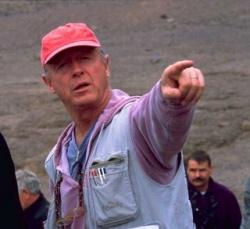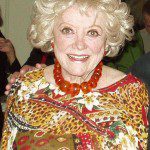Entertainment World Mourns Deaths of Director, Comedienne and Singer-Songwriter
By • August 27, 2012 0 947

“No more Tony Scott films. Tragic day.” That was a tweet from Ron Howard, the Hollywood director and child television star who’s had quite a few hit films himself, upon learning of the death of Tony Scott, who jumped from a bridge in Los Angeles Aug. 19, an apparent suicide, perhaps due to a rumored inoperable cancer diagnosis.
Directors, unless they win an Oscar, or are known publicity hounds and enfant terrible, rarely make the gossip columns, the cover of People Magazine or the lead story on Access Hollywood, although it’s likely Scott will make the latter tonight.
Scott is best known for two things—he directed the entertainingly commercial megahit “Top Gun,” which made Tom Cruise a super star, and he was brother to Ridley Scott, another big-time busy and hard-working Hollywood director who achieved both critical and commercial success, along with the occasional flop and hiss, as was the case with Scott. Between the brothers, they directed around or thereabouts 40 films, at least, all of them in the top drawer category in terms of money spent, all being dubbed “a major Hollywood film.” They also had a production company in which they produced such television shows as “The Good Wife” and “Numbers.” Both of them just seemed to work and work, leading to an uneven, but eclectic output, all of them greeted with high anticipation.
Tony Scott was 68, and his brother is 74, but Tony arrived in Hollywood first, and directed “The Duelists,” a eccentric choice to say the least, in which David Carradine and Harvey Keitel battle each other across Europe during the Napoleonic wars. It was also a strangely haunting and beautiful film in looks, authenticity and atmosphere. That was followed by “The Hunger,” a sexy (how could it not be) vampire film with Catherine Deneuve and Susan Sarandon along with David Bowie.
“Top Gun” was a break-out hit and seemed to drive Tony into ever more commercial arenas, such as the stock car racing movie “Days of Thunder” (Cruise meets Nicole Kidman with crusty Robert Duvall), “Beverly Hills Cop II.”
Both Scott brothers had a style: Tony’s later and better films, many of them with Denzel Washington, had an electric, hand-held but with big bucks quality that put the action and energy into action films like “Enemy of the State,” “Unstoppable,” “Déjà vu” and “Unstoppable.” But there was also the really underrated “Man on Fire,” in which Washington played a doomed bodyguard. His films were eminently watchable and re-watchable, a quality they share with the best of his brother Ridley’s films, such as “Gladiator,” “Thelma and Louise,” “Kingdom of Heaven,” “Black Hawk Down,” “Hannibal” and the original “Alien.”
Phyllis Diller, 95
Before there was Joan Rivers—the one we know now—there was Phyllis Diller.
Diller, the pioneering funny woman—passed away Aug. 20 at 95. Somewhere, some place, there is someone telling a joke in her honor today, preferably a female standup comic not yet heard from but very funny nonetheless.
Diller made fun of people, she made fun of the famous and infamous, she could tell an old or new joke with the best of the standups and Catskill guys, but mostly she was funny because she could make fun of herself. We thought she was funny because she thought she was funny. It was an odd kind of thing—we laughed at the funny-looking woman on stage or on television, because she was laughing at the funny looking woman herself.
She was part of the tribe of comedians who told what’s considered the world’s dirtiest joke in the film “The Aristocrats,” which was not so long ago. Rivers paid tribute to her, saying she “broke the way for every woman comedian.”
She started out in 1952, when there were few funny women in show business except perhaps for Lucille Ball and Minnie Pearl, and the generic mothers-in-law. She was a pioneer, appeared with Bob Hope regularly, had her own TV show and was on the ’60s hit, “Laugh In.” And lived a long time to laugh about it all.
Scott McKenzie, 73
If ever there was a song that signified an age (“The Age of Aquarius,” to be specific), it was probably Scott McKenzie’s “San Francisco”, a number-one hit that was so omnipresent in 1967 that you’d swear flower children were taking over the world.
The song—written by the late John Phillips of the Mamas and Papas—had incense smoke trailing behind it, it was full of the imagery of the city and Haight Ashbury of the 1960s, and the heady, high whiff of grass, the look of tie-dyed jeans, Peter Max posters, long blonde, languid hippie girls, flashing a peace sign, the noise of the music coming from the Avalon and Fillmore West and granny glasses and Janis Joplin blues and the Jefferson Airplane and the Monterey Pop Festival and the Grateful Dead.
It seemed that way to me when my wife and two-year old drove from Norman, Okla., to San Francisco and got stuck in a huge traffic jam on Highway 101 and then heard “San Francisco” a dozen times before we escaped the jam, the sound of “be sure to wear flowers in your hair” resonant in our ears. My wife, who was a singer, wore a flower in her hair. I did not.
It’s a long-ago time, but the song snaked its way, like an aroma of a good time, into history. McKenzie also had a success with “Kokomo,” a song he had written and which the Beach Boys recorded. He toured with the Mamas and Papas in 1988.
McKenzie died Aug. 18 of Guillain-Barre Syndrome in Los Angeles.
- Tony Scott (Born: July 21, 1944) | http://wiki.tarantino.info




